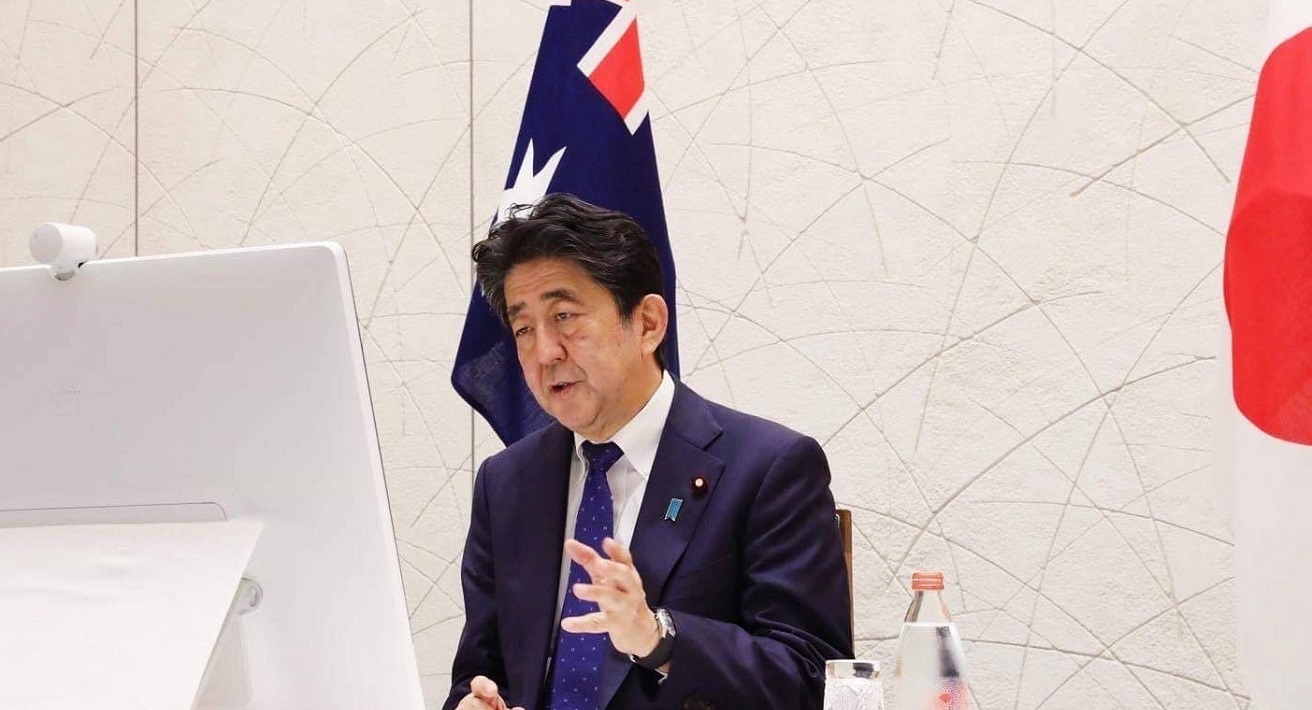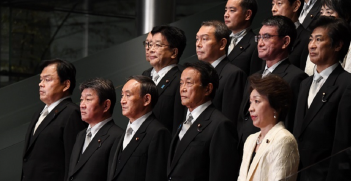Abe the Gamechanger Stumbles to Exit Under a Cloud

The abrupt resignation of Prime Minister Abe Shinzo due to poor health has sent shockwaves across the political landscape. This has raised concerns about the implications for Japan’s economy and foreign policy.
Leaders seldom time their exits well, hanging on to burnish a legacy only to get slammed by a crisis or scandal. Scanning the mass media political obituaries, there is a consensus that Abenomics was a flop and his womenomics policy a sham, while his cherished goal of constitutional revision never gained traction. He stood tall for free trade and managed Trump better than anyone else, but his most important legacy is providing stability just by lasting so long. The “Teflon premier” weathered a number of scandals involving document tampering and shredding, various cover-ups, and sweetheart land deals and special permissions for cronies, but this eroded public trust in him.
Under Abe, the political centre of gravity shifted sharply rightward, and there was a recrudescence of reactionary nationalism. He also strengthened the power of his office over top-level bureaucratic promotions, enhancing political control over the mandarins (Japanese bureaucrats). This, however, encourages a culture of sontaku (doing what one assumes a boss wants done to curry favour) among the ambitious that obscures responsibility for the alleged abuses of power that have dogged Abe since 2017. There is considerable speculation that these numerous scandals played a role in Abe’s decision to step down.
Abe came to power promising to rev up the economy, enact sweeping reforms, and assume a bolder role on the international stage. Abenomics entered the global lexicon, and his three arrows of monetary easing, fiscal stimulus, and structural reform generated a positive buzz. After two lost decades of anaemic growth and policy drift, Abe seemed like a gamechanger who could help Japan regain its mojo. On his watch, the Bank of Japan (BOJ) engaged in massive quantitative easing, driving down interest rates and the value of the yen. Corporate profits soared, and it seemed that Abe’ shock therapy had revived a wallowing economy. The Nikkei stock average doubled during his tenure, boosted in part by massive BOJ and government pension fund purchases and a surge in foreign investments. But the party was short-lived, as Abe implemented two tax increases that doubled the consumption tax and the shock of unconventional monetary policy wore off.
Moreover, the benefits never trickled down as wages remained stagnant and households didn’t feel the love. The conceit of Abenomics was that deflation was a mindset, and if the government could change the national mood and generate optimism then consumption would rise along with the economy. Alas, low consumption was due to thin wallets not a collective psychosis. Abe tried to jawbone Japan, Inc. into boosting wages, but had no luck because corporate Japan didn’t think Abenomics was sustainable.
Abenomics sputtered along, but Abe never managed to push through significant structural reforms. His signature policy of womenomics pledging to empower women never got off the ground, and according to the 2020 World Economic Forum, Japan’s ranking on gender equality slipped to 121, the lowest among advanced economies and down 11 rungs from the previous year. Due to Japan’s ageing and shrinking population, labour shortages have intensified, and expanding women’s employment, mostly in non-regular employment, has not been a sufficient remedy.
Immigration offers a solution, but Abe opposed welcoming immigrants, instead promoting limited migrant labour in certain sectors for a limited duration. The target of 345,000 migrant workers by 2025 is too small to make much of a difference in a labour market exceeding 60 million, and since the program was implemented, it has attracted few applicants because the conditions are unwelcoming. There are many factors that impede gender equality and immigration, but Abe could have used his power to push for more. His half-measures represent urgent, unfinished business for his successors.
In terms of diplomacy, Abe has done more than all of his predecessors combined in fulfilling the Pentagon’s wishlist. He focused on strengthening ties to the US and shoring up the alliance with his so-called “proactive pacifism.” He agreed to new US-Japan Defense Guidelines in 2015 and then instigated the largest protests in Japan since the turbulent 1960s when he rammed enabling legislation through the Diet. The public fears that Abe has signed up for more than they are comfortable with, and that his collective self-defence (CSD) legislation is unconstitutional. Essentially there is widespread anxiety that sometime, somewhere Japan will be dragged into conflict at Washington’s behest even if has little to do with defending Japan.
In early 2020, the constraints imposed by limited public support came to the fore as Tokyo fended off Washington’s request to join a US-led coalition of allied navies escorting oil tankers following a series of attacks near Iran, including a Japanese-owned vessel. Instead, Japan dispatched one ship to the somewhat distant but less dangerous Gulf of Oman on an intelligence gathering mission. Abe’s half-hearted response walked the tightrope of not alienating President Trump, Iran, or Japanese public opinion, a risk-averse approach that is a reality check for those eager for Japan to embrace a more robust security doctrine.
Abe did not join the coalition naval patrols because he feared a public backlash and at the time still entertained hopes for constitutional revision. No doubt Washington’s security wonks are disappointed that Japan is not doing more burden sharing and is too skittish to be its deputy sheriff in Asia, but pacifism remains embedded in the national identity. Even hawkish Japanese politicians are aware they are walking on thin ice when they dispatch troops overseas.
The nostrum of shared values is often invoked as the foundation of the alliance, but at least in Okinawa, this means sidelining public sentiments and ignoring the democratic voice of islanders expressed in several elections. Abe has remained steadfast in supporting the construction of an offshore military base in Henoko to facilitate the relocation of the US Marine Corps Air Station Futenma, despite overwhelming opposition among Okinawans to this plan. The Futenma location in a densely populated city is dangerous, but islanders fear that constructing the Henoko base will have devastating environmental consequences and resent that their prefecture hosts most of the US military facilities and personnel.
By ignoring Okinawan voices and deferring to Washington, has Abe really strengthened the basis of the alliance? Similarly, if Japanese leaders can’t fulfil commitments undertaken in the 2015 US-Japan Defense Guidelines due to a squeamish public, isn’t there a risk of stoking recriminations in Washington that undermine bilateral ties? The government couldn’t even find a town willing to host an Aegis ashore missile defence system because locals saw this as more of a target than a shield, a perception Okinawans share about US bases. Japan lives in a much more dangerous neighbourhood than when the peace constitution was enacted in 1947. China and North Korea pose a threat, but there is a strong disconnect between the views of alliance managers and the public.
Much is made of Abe’s successful fawning over Trump, but this hasn’t prevented Trump from abandoning the Trans-Pacific Partnership, slapping sanctions on Japan and demanding a quadrupling of host country support for US bases to $8 billion. Trump knows he has Japan over the barrel on security and is taking advantage of its vulnerability, adding to the scar tissue of gathering resentment over his highhanded bullying.
Paradoxically, Abe’s legacy is meagre, a case of power without purpose, but he dominated the political landscape and just by providing stable political leadership, he gained significant stature at home and abroad. It appears that Chief Cabinet spokesman Suga Yoshihide has been anointed to serve out Abe’s term until September 2021, representing policy continuity at a time when Japan could use some fresh thinking about its various challenges. In terms of foreign policy, Suga is not so closely associated with Abe’s Russia policy or commitment to resolving the abductions of Japanese nationals by North Korean agents in the 1970s and 1980s, and these issues may slip down the agenda. Suga is not so reviled by the South Korean public, so there may be opportunities to overcome the divisive past. Although he has been a very effective lieutenant, he will lack the stature of Abe to hit the reset button on foreign policy priorities. He is a nose-to-the-grindstone manager of details rather than someone who can convey a vision, safe hands without inspiration. Precisely at a time when Japan needs a resolute leader, there is a nagging suspicion that Japan is headed for weaker leadership and policy drift.
Jeff Kingston is the Director of Asian Studies at Temple University Japan. He is author and editor of a dozen books, including Press Freedom in Japan (Routledge 2017), Japan (Polity 2019) and the Politics of Religion, Nationalism and Identity in Asia (Rowman & Littlefield 2019). He edited a two-part collection of essays titled “The Tokyo Olympics Past and Present” earlier this year for the Asia Pacific Journal Japan Focus, which can be viewed at https://apjjf.org/2020/4/APJ.html and https://apjjf.org/2020/5/APJ.html.
This article is published under a Creative Commons License and may be republished with attribution.



